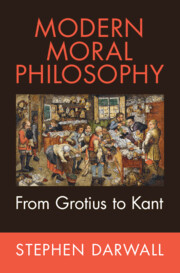Book contents
- Modern Moral Philosophy
- Modern Moral Philosophy
- Copyright page
- Dedication
- Contents
- Preface
- Acknowledgments
- Introduction
- 1 Grotius
- 2 Hobbes and Pufendorf
- 3 Locke and Cumberland
- 4 Spinoza, Cudworth, Shaftesbury, and Leibniz
- 5 Hutcheson and Butler
- 6 Hume and Smith
- 7 The British Rationalists and Reid
- 8 Rousseau and Kant
- Works Cited
- Index
Introduction
Published online by Cambridge University Press: 10 June 2023
- Modern Moral Philosophy
- Modern Moral Philosophy
- Copyright page
- Dedication
- Contents
- Preface
- Acknowledgments
- Introduction
- 1 Grotius
- 2 Hobbes and Pufendorf
- 3 Locke and Cumberland
- 4 Spinoza, Cudworth, Shaftesbury, and Leibniz
- 5 Hutcheson and Butler
- 6 Hume and Smith
- 7 The British Rationalists and Reid
- 8 Rousseau and Kant
- Works Cited
- Index
Summary
In “Modern Moral Philosophy” Anscombe famously argues against the main thrust of European ethical philosophy since the mid-seventeenth century. Her main complaint is that the conceptual structure of modern moral philosophy – focusing on obligation, duty, right, and wrong, rather than the classical Greek focus of virtue and the good life – cannot be sustained without divine legislation, which many moderns have tried to avoid. Modern Moral Philosophy: From Grotius to Kant will carefully analyze both canonical and lesser known texts to demonstrate that philosophers of the period have resources to answer Anscombe’s Challenge. Many of the philosophers studied were central in this: early modern natural lawyers Grotius, Pufendorf, and Hobbes; critics of natural law, like Leibniz and Shaftesbury; moral sentimentalists Hutcheson, Hume, and Smith; rationalists like Clarke, Price, and Reid; and, of course, Kant. One of the most interesting sources of response is a connection many philosophers made between morality and accountability and insights they had about the psychological prerequisites and presuppositions of accountability.
Keywords
- Type
- Chapter
- Information
- Modern Moral PhilosophyFrom Grotius to Kant, pp. 1 - 14Publisher: Cambridge University PressPrint publication year: 2023

